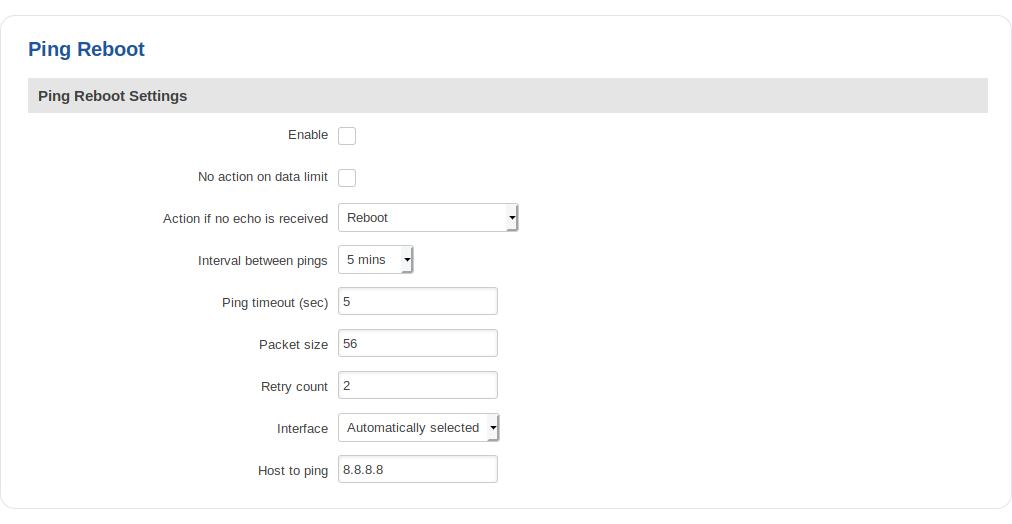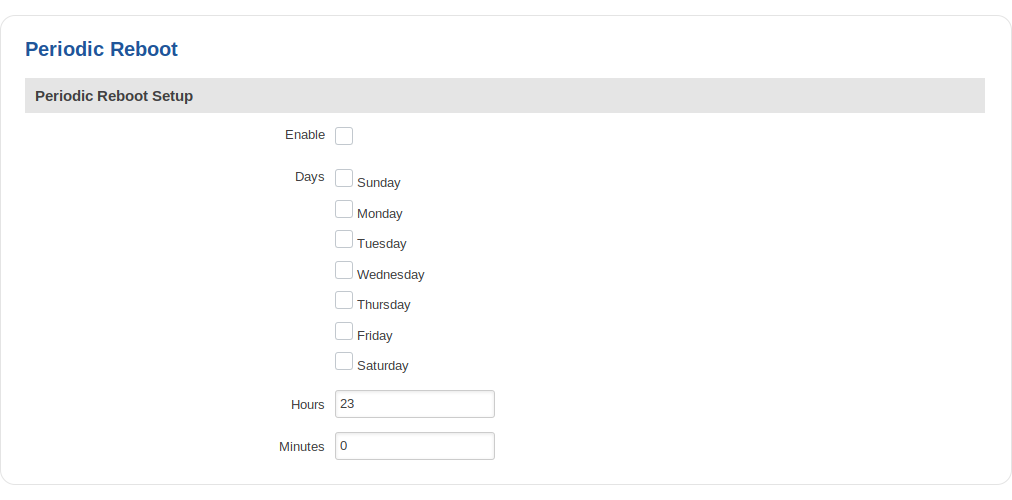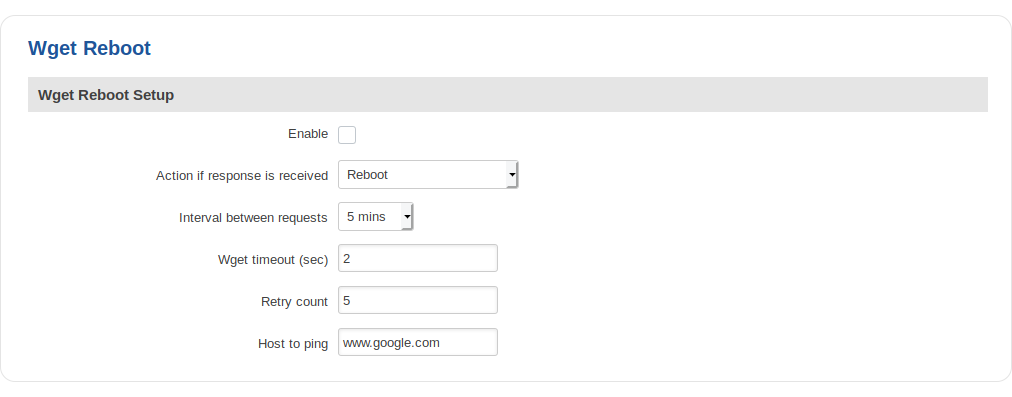RUT850 Auto Reboot
Summary
This chapter is an overview of Auto Reboot functions of RUT routers.
Ping Reboot
The Ping Reboot function will periodically send Ping commands to a specified server and wait for received echos. If no echo is received, the router will send Ping commands a defined number of times at a defined frequency of time. If no echo is received after the defined number of unsuccessful retries, the router will reboot.
Ping Reboot Configuration
| FIELD NAME | VALUE | DESCRIPTION |
|---|---|---|
| Enable | yes | no; Default: no | Toggles Ping Reboot ON or OFF |
| No action on data limit | yes | no; Default: no | If enabled, stops actions after data limit is reached |
| Action if no echo is received | Reboot | Modem restart | Restart mobile connection | (Re)register | none; Default: Reboot | If enabled, stops actions after data limit is reached |
| Interval between pings | 5 mins | 15 mins | 30 mins | 1 hour | 2 hours; Default: 5 mins | Interval at which ping requests are sent to the specified host |
| Ping timeout (sec) | integer [1..9999]; Default: 5 | Time after which a ping is considered as unsuccessful |
| Packet size | integer [0..1000]; Default: 56 | Defines the ping packet size in bytes |
| Retry count | integer [1..9999]; Default: 2 | Defines how many ping retries before the router takes the specified action |
| Interface | Automatically selected | Ping from mobile; Default: Automatically selected | Specifies through which interface the pings will be sent. If Automatically selected is set, the pings will go through the main WAN interface |
| Host to ping | host | ip; Default: 8.8.8.8 | Host to send pings to. Select a host that is usually always reachable through WAN, e.g., Google's DNS server 8.8.8.8 |
Periodic Reboot
Periodic reboot is a function that reboots the router at a specified time interval regardless of other circumstances.
| FIELD NAME | VALUE | DESCRIPTION |
|---|---|---|
| Enable | yes | no; Default: no | Toggles Periodic Reboot ON or OFF |
| Days | Monday | Tuesday | Wednesday | Thursday | Friday | Saturday | Sunday; Default: " " | Selects a day or multiple days to which the Periodic Reboot function will apply to |
| Hour | integer [0..23]; Default: 23 | The hour that the router will reboot |
| Minute | integer [0..59]; Default: 0 | The minute that the router will reboot |
Wget Reboot
The Wget Reboot function works in a very similar manner to Ping Reboot. Ping Reboot sends ping requests to determine whether the conditions for the specified action have been met, while Wget Reboot sends Wget requests for the same purpose. Wget is a computer program that retrieves content from web servers.
| FIELD NAME | VALUE | DESCRIPTION |
|---|---|---|
| Enable | yes | no; Default: no | Toggles Wget Reboot ON or OFF |
| Action if response is received | Reboot | Modem restart | Restart mobile connection | (Re)register | None; Default: Reboot | The action that will be performed after the specified number of failed Wget requests |
| Interval between requests | 1 mins | 2 mins | 3 mins | 4 mins | 5 mins | 15 mins | 30 mins | 1 hour | 2 hours; Default: 5 mins | Interval at which Wget requests will be sent to the specified host or IP address |
| Wget timeout (sec) | integer [1..9999]; Default: 2 | Time after which a Wget request is considered as unsuccessful |
| Retry count | integer [1..9999]; Default: 5 | Specifies how many retries before the router takes the specified action |
| Host to ping | host | ip; Default: http://www.google.com | Host or IP address to send Wget requests to |




